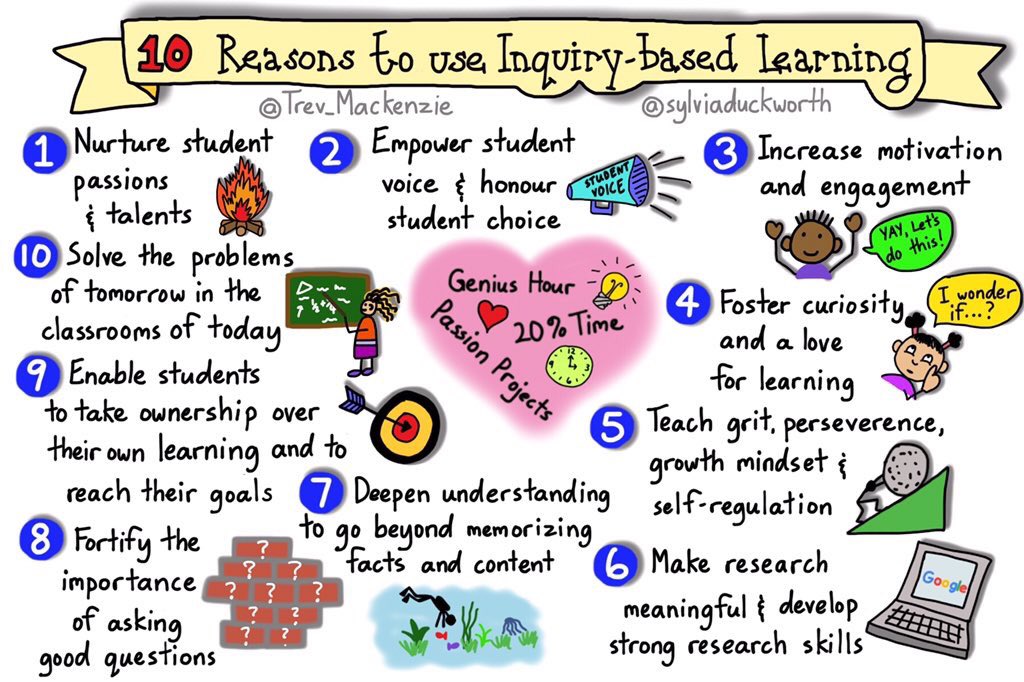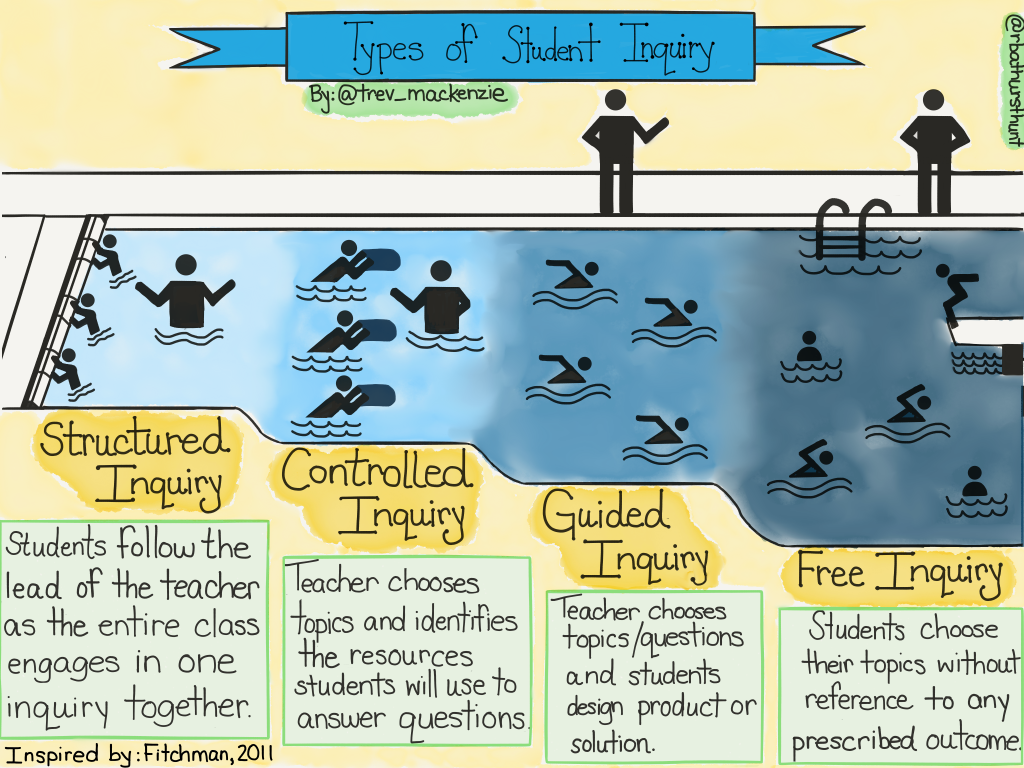Inquiry & Mozart Minutes
In May I wrote about a project I was doing with the 5th-grade band and orchestra students that we called “Mozart Minutes.” Mozart Minutes was essentially our version of a Genius Hour, where students could create their own projects relating to music. I neglected to do a follow-up post, which I realized this week while participating in an Inquiry Mindset book study. This post is going to be a combination -part Inquiry Mindset reflection, and part Mozart Minutes recap!
Inquiry Mindset
Trevor Mackenzie and Rebecca Bathurst-Hunt wrote Inquiry Mindset as a follow-up to Trevor’s book, Dive into Inquiry. After reading Dive into Inquiry last summer, I knew I needed to add an inquiry component into my instrumental music curriculum.

The book begins by describing the characteristics of an inquiry teacher and the reasons you should incorporate inquiry into the classroom. I have to say: I LOVE the sketchnotes throughout the book! The sketchnote “10 Reasons to use Inquiry-based learning” perfectly describes what we should all want for our students. It lines up with why I wanted to do an inquiry project and why I think this type of learning is valuable in a music classroom.
- Nurture students passions and talents – While all students at my school are required to play a band or orchestra instrument, I understand band and orchestra might not be their first passion in music. I wanted students to have the opportunity to showcase their talents, be it singing, a different instrument, composition, or any other means of musical expression.
- Empower student voice and honor student choice – This was my motto for the school year! Give students a voice and a choice; they will take ownership, get leadership opportunities, and ultimately it becomes a more powerful learning experience.
- Increase motivation and engagement – A no-brainer! I always want students to be motivated and engaged in my classroom.
- Foster curiosity and a love for learning – As I mentioned before, I understand that band and orchestra might not be every student’s first choice for music. If I can create an environment where students love to learn, they can hopefully transfer that love and curiosity to music that is their passion.
- Teach grit, perseverance, growth mindset, and self-regulation – I want students to gain skills that will stay with them for life. Learning to play a musical instrument is not easy, and neither is completing an independent or inquiry project. Students must learn to stick with things, even when the going gets tough.
- Enable students to take ownership over their own learning, and to reach their goals – Throughout the year as we moved towards the inquiry project, students were asked to set goals and make choices about their learning. I think it’s important for students to have this opportunity as it makes their learning even more meaningful.
Chapter 3 discusses the inquiry cycle, and this is one area I would like to improve upon for next year. Trevor and Rebecca detail several steps that take place before the actual research/work on the final product. These steps include identifying an essential question, brainstorming additional questions and subtopics, relating to prior knowledge, and determining what to research. I think the next time I have students complete a Mozart Minutes project, I will have them spend more time preparing before the project begins. While I had students brainstorm project ideas and formulate plans for their projects, it still felt rushed. In the future, helping students construct their essential questions, identify their additional questions, and relate it all to what they already know, should make the process go more smoothly.
Another great sketchnote found in chapter 4 describes the different types of student inquiry. The Mozart Minutes project is a free inquiry. “Types of Student Inquiry” is my favorite sketchnotes from the book, as I love the detail in each section of the pool. The nuance in what the students are doing, what the teacher is doing and where, and the tools students use is excellent. The key to being successful with inquiry is starting in the shallow end of the pool. This year some things in my classes included a gradual release of control, but they were not necessarily inquiry based. I would like to be more deliberate about including inquiry activities at the beginning of the year to help students become more successful later. For example, when thinking about musical expression, move from the teacher making musical decisions and leading students to determine purpose, to allowing students to make musical decisions and having to defend their choices. While I realize this is not typical inquiry, questions are being formulated and answered. What happens if we slow down here? Why would the composer put a crescendo there? If we want to build tension, what should we do? This is one way I plan to work through the inquiry pool next year, and hopefully, it will help students become more confident when it comes to asking questions. I will continue brainstorming additional ways to do this over the summer.
Mozart Minutes Reflection
When it comes to the actual Mozart Minutes project, I would say it was a success. Students were asked to have a final digital product to share – video, slideshow, picture, etc. – that we compiled into a Google Slideshow the entire grade could view. Finally, students participated in a grade-wide gallery walk. Half of the students stood on the perimeter of the gym with their presentations, while the other half walked around to view presentations. The groups then switched roles. It was chaotic, to say the least (96 students will do that!) but given the circumstances of available time and space, this was what worked. Next year I would like to make time for students to give “almost done” presentations in small groups. This will make the gallery walk day more comfortable.
There was a wide variety of projects, as well as a wide variety of effort put into them. Some students did not complete their projects, for many reasons, and some went above and beyond expectations. One problem we ran into had to do with technology. Halfway through the project timeframe students were told iPads could not be taken home anymore (due to testing). Even though students knew from the beginning that projects were to be completed during class time, this still impacted many of them. We will consider timing in that respect for next year. Some of the final projects were:
- researching musicians or composers
- learning how specific instruments are made
- composing music
- building an instrument
- learning to play new songs on instruments
- writing (and filming) a musical
- filming a talk show, interviewing (student) musicians
- researching lesser-known female composers and musicians
- creating a tutorial video series
I loved the creativity! One of my favorite moments was when a group of students was investigating string instruments – they had an iPad, a violin, rubber bands, cardboard, and a few other items. They were trying to determine what factors impacted the sound of string instruments. They researched and experimented with materials, string length, shape, bridge, and more. The authentic questions they were asking (and finding answers to) were inspiring, and the students were completely engaged in the learning process. Another student wanted to learn about how composers come up with movie theme songs. He researched movie music, then came up with a list of questions that we emailed (thanks to my awesome PLN!) to someone who writes music for movie trailers! (David James Rosen – super nice guy!) David responded, and my student got some great information. My favorite quote from David was this: “Usually it’s a lot of messing around until I find the thing that feels right; I have to play lots of wrong things before I find the right thing.”
Following the gallery walk, students completed an evaluation of the Mozart Minutes project. The majority enjoyed it and agreed next year’s 5th-graders should also experience the same type of project. Most asked for more time, and the ability to take their iPads home throughout. Some students did not enjoy their topics and would have rathered play their instruments for five weeks. I’ll admit, this part was difficult for me too. The classroom was surprisingly quiet! (When there are typically 6-8 students playing different things on their instruments at the same time, you get used to it being loud!) It was hard for me knowing how many students were not playing their instruments during that time because they had chosen something else for the project. I know that’s the point, students can choose their musical passion, it’s just something I will have to consider for next year. Also, after the gallery walk I found this blog post by John Spencer: The 5 Biggest Mistakes I Made With Genius Hour and How I Fixed Them. I plan to read this several times over the next few months in preparation for next time!
At the end of the day, the Mozart Minutes project was a success. Thanks to both Dive into Inquiry and Inquiry Mindset I have some great ideas to incorporate next year in an attempt to help students find even more success in the project. I think there is so much value in giving students this opportunity, and even with my sadness over the lack of instrument playing, this is project worth refining. I hope others will consider how they too can infuse inquiry into their music classes and empower students to own their learning in this way.
Links for further reading:
A Place For Inquiry in the Arts
Enjoy what you have just read? Please consider following my blog! You will get an email notification when new posts are published. Email addresses will not be shared or distributed.


It sounds like you and your students had a lot of fun with this! Thanks for reflecting and sharing some additional resources. I’ll be checking them out for our projects next year too!
Thanks! We definitely used your blog posts for reference/advice through a lot of it!
I love so much about this, but especially how you tie inquiry into musical choices. That is something we want our students to learn, and it totally goes along with inquiry mindset! You are speaking to my musical heart!